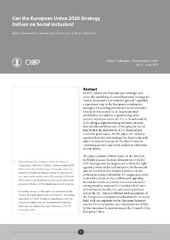| dc.contributor.author | Petmesidou, Maria | |
| dc.date.accessioned | 2017-07-03T10:17:21Z | |
| dc.date.available | 2017-07-03T10:17:21Z | |
| dc.date.issued | 2017-06-30 | |
| dc.identifier.isbn | 9788293554059 | |
| dc.identifier.uri | https://hdl.handle.net/1956/16140 | |
| dc.description.abstract | In 2010, amidst the financial and sovereign debt crisis, the launching of a novel European strategy for “smart, sustainable and inclusive growth” signalled a significant step in the European coordination strategies for tackling poverty and social exclusion. Crucial in this respect is the unprecedented prominence accorded to a quantified goal in poverty reduction across the EU, to be achieved by 2020, along a supranational governance process that sets the ambitious aim of bringing the social field within the framework of EU financial and economic governance. In this paper, I critically examine how this new strategy has fared so far and what the expectations are for its effectiveness in combating poverty and social exclusion within the set timeframe. | eng |
| dc.language.iso | eng | eng |
| dc.publisher | CROP | eng |
| dc.relation.ispartofseries | Global Challenges - Working Paper Series | eng |
| dc.subject | European Union | eng |
| dc.subject | Social inclusion | eng |
| dc.title | Can the European Union 2020 Strategy Deliver on Social Inclusion? | eng |
| dc.type | Working paper | eng |
| dc.description.version | publishedVersion | |
| dc.rights.holder | Copyright the author(s). All rights reserved | eng |
